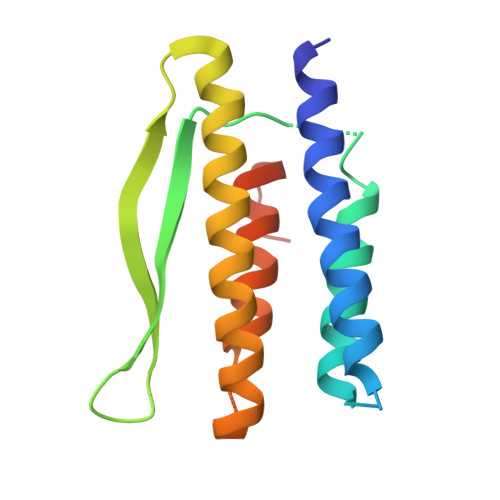One-shot design of functional protein binders with BindCraft.
Pacesa, M., Nickel, L., Schellhaas, C., Schmidt, J., Pyatova, E., Kissling, L., Barendse, P., Choudhury, J., Kapoor, S., Alcaraz-Serna, A., Cho, Y., Ghamary, K.H., Vinue, L., Yachnin, B.J., Wollacott, A.M., Buckley, S., Westphal, A.H., Lindhoud, S., Georgeon, S., Goverde, C.A., Hatzopoulos, G.N., Gonczy, P., Muller, Y.D., Schwank, G., Swarts, D.C., Vecchio, A.J., Schneider, B.L., Ovchinnikov, S., Correia, B.E.(2025) Nature
- PubMed: 40866699
- DOI: https://doi.org/10.1038/s41586-025-09429-6
- Primary Citation of Related Structures:
9HAC, 9HAD, 9HAE, 9HAF - PubMed Abstract:
Protein-protein interactions are at the core of all key biological processes. However, the complexity of the structural features that determine protein-protein interactions makes their design challenging. Here we present BindCraft, an open-source and automated pipeline for de novo protein binder design with experimental success rates of 10-100%. BindCraft leverages the weights of AlphaFold2 (ref. 1 ) to generate binders with nanomolar affinity without the need for high-throughput screening or experimental optimization, even in the absence of known binding sites. We successfully designed binders against a diverse set of challenging targets, including cell-surface receptors, common allergens, de novo designed proteins and multi-domain nucleases, such as CRISPR-Cas9. We showcase the functional and therapeutic potential of designed binders by reducing IgE binding to birch allergen in patient-derived samples, modulating Cas9 gene editing activity and reducing the cytotoxicity of a foodborne bacterial enterotoxin. Last, we use cell-surface-receptor-specific binders to redirect adeno-associated virus capsids for targeted gene delivery. This work represents a significant advancement towards a 'one design-one binder' approach in computational design, with immense potential in therapeutics, diagnostics and biotechnology.
- Laboratory of Protein Design and Immunoengineering, École Polytechnique Fédérale de Lausanne and Swiss Institute of Bioinformatics, Lausanne, Switzerland. martin.pacesa@epfl.ch.
Organizational Affiliation:





















